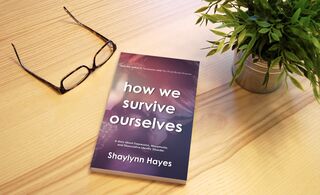Misophonia
How Do We Survive Ourselves?
Author and mental health advocate Shaylynn Hayes explains in her new book.
Posted September 1, 2021 Reviewed by Jessica Schrader
Key points
- Writing can be an excellent method of working through mental illness.
- Advocacy can also be very constructive for those with mental health problems.
- The more young adults understand mental health issues, the more they can help themselves and each other.
Personally, I am thrilled to see the rise in mental health advocacy in the past 25 years. However, I am even more pleased to see the de-stigmatization of mental health issues that adolescents and young adults are responsible for in this country. Further, when I talk to adolescents and young adults I am amazed at the high level of knowledge they have acquired about mental health. When I was young (I'm 56 years old) we did not talk of such matters and it is my honor to interview Shaylynn Hayes, author of How We Survive Ourselves.

Jennifer: Would you give us a synopsis of your book?
Shaylynn: How We Survive Ourselves is a fiction novel about characters dealing with depression, dissociative identity disorder (DID), and misophonia. I also include a character who is a therapist as well as the wife of the DID sufferer, to help highlight mental illnesses’ widespread effects on others. This book follows our characters from an in-patient facility to life at home, and hopefully is an honest look at mental illness.
Jennifer: What inspired you to write How We Survive Ourselves?
Shaylynn: I don’t know if inspired is the right word for this book. I remember the first time I wrote from Ruth’s perspective—years ago. I was on a bus on my way home from university for a break. I wrote the chapters on my phone (or iPod, I can’t remember just how long ago this was). I’ve struggled with depression since I was 12 years old (and later misophonia). Originally the book was a fictionalized journal. While the events Ruth experienced were completely fictional, I used her story to help transfer my emotions onto paper.
Jennifer: How interesting...
Shaylynn: About two or three years ago I began researching DID, as I was fascinated by the real stories of people with this condition—I also wanted an account of DID that was not like what we see on TV (think of the movie Split). I am passionate about realistic mental-illness awareness that does not simply “thrill-seek” or “entertain” (although it can certainly be entertaining, too). Adra’s perspective was added to showcase misophonia, which was largely inspired by my own life—albeit not the same relationships, etc. I questioned whether three storylines/illnesses that are unrelated could make up one book despite their separate narratives, and eventually I decided I just wanted to tell these stories, narrative be damned.
Jennifer: I know you have done a lot of advocacy work for misophonia. Would you explain why you also included DID and depression in your book?
Shaylynn: It’s a bit opposite—I included misophonia in a book I was writing about depression and DID. My original old drafts of this book (scraps really) were started before I was an advocate for misophonia, and before I even knew misophonia was going to be a huge part of my life (my symptoms of misophonia came later than it did for most). The book came together on its own over time, as though everything clicked into place. Including misophonia was important to me as an advocate, but I also wanted to show a misophonia sufferer as more than just an advocacy prop. Adra is a real person with ideas, thoughts, and dreams, just like all of us sufferers. On the same front, Ruth is more than her depression, and Riann is a loving man who deserves happiness and fulfillment. Honestly, the “characters” of this book are very real to me, and I am so humbled to tell their stories of healing.
Jennifer: Your descriptions of these conditions/mental illnesses are painfully rich and vivid. Would you describe the process by which you were able to write with such realism, detail, and empathy?
Shaylynn: Hemingway once said, “There's nothing to writing. All you do is sit down at a typewriter and open a vein.” I couldn’t agree more. Similar versions of this quote are reported by other authors, and man I can see why. Writing is a purely emotional endeavor, and even if it’s not a disorder we have (like DID), it’s very important to talk to others, ask questions, and then feel the characters out. My process is erratic. I research in between, I write snippets, and I let things happen organically. If an idea suddenly springs in my head, I’ll often go with it and work around whatever is inspiring or interesting to me.
Jennifer: You are such an interesting mix of an advocate and a writer, Shaylynn, and you have truly turned "negatives" in your and others' lives into constructive meaning!
Shaylynn: I think the most important part of my writing is I don’t force it. There’s no “1,000 words a day” or structured system. I write when I feel something. For example, when editing, I can always tell if I was hungry writing a chapter if they’re eating a lot. The physical act of writing is the easy part, it’s getting in the zone and becoming the characters that’s hard.
Jennifer: How We Survive Ourselves is a wonderful title. Is there a message behind the title?
Shaylynn: A lot of talk around mental (and neurological) illnesses focuses around “treatment” and “cure.” I think this is wholly unrealistic. I will always have depression, OCD, and misophonia, even when I am coping better, and even when I am medicated. The title How We Survive Ourselves is not about overcoming our brains, it’s about surviving, thriving, and living your best life as a person with a neurological or mental illness. For example, I can dye my brown hair red, but I am still a person with brown hair. We’re all just living our lives and trying to survive what we’ve been given, and honestly, I think it’s really important to find ways to survive ourselves. The word “survive” is also important because I get a little frustrated by people who say “love your pain” or “mental illness is beautiful.” Survive implies there is struggle, and there absolutely is. Also, it’s OK to recognize that it’s hard!
Jennifer: Is there any advice that you would give to a person suffering from mental illness?
Shaylynn: I can summarize everything I want to say about mental illness in two succinct words, “Get treatment.”
Jennifer: Thank you so very much for this interview, Shaylynn!
How We Survive Ourselves is available on Amazon.


